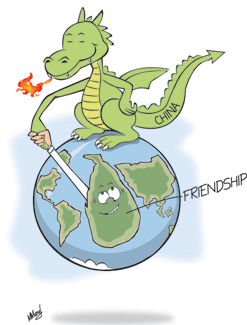Columns
Opportunities, challenges and lessons of Chinese economic growth
The rise of China is one of the most momentous transformations in modern world history. According to Prof. Premachandra Autukorala, the Chinese economy is likely to overtake the US economy in terms of GDP within this decade, would be the world’s biggest economy in size and be a dominant trading and investment source in the coming decade. Since 2008 China has been the world’s largest exporter, followed by the US, Germany and Japan, in that order.

Prof. Atukorala, who teaches economics at the Australian National University (ANU) and is an Honorary Professorial Fellow of the University of Manchester, UK, made these remarks while delivering the third Gamani Corea Foundation Lecture on the topic “China’s Rise in The World Economy: Opportunities and Challenges for Developing Countries”.
Prof. Autukorala thought that: “The extent to which China becomes either an opportunity or a challenge for a given country is not predetermined but will depend greatly on its own policy choices and internal economic dynamics.” Due to its size, possibilities for further economic expansion, and the uniqueness of its political system, he observed, China poses unprecedented opportunities and challenges for the global community in both economic and geo-political terms. He was of the view that the extent to which China becomes either an opportunity or a challenge depends on the policy choices of other countries and how they respond to China’s rise in the global economy.
Developed and developing economy
Despite the size of the Chinese economy, Prof. Autukorala observed that China would remain a “precocious economic power in the foreseeable future”. He explained that the Chinese economy “combines the characteristics of both a developed and a developing economy”. China’s economic dominance will occur at living standards associated with the average per capita income and living standards associated with a middle-income country. “Projections suggest that by 2030 living standards in China will resemble that of the UK around 1870 and the US in the aftermath of the Second World War. About 150 million people (nearly one in ten) Chinese citizens still live on the equivalent of $1.50 a day or less.”
While the Chinese economy has grown by leaps and bounds, the incidence of poverty remains high and there is still a vast pool of surplus labour. He summarised China’s economic transformation as that of a continent, with continental-style disparities, rather than that of a developed country.
Trade dependence
China’s dependence on foreign trade is unusually high for a continental economy and her export dynamism is largely driven by “global production sharing”. He pointed out that “China is the premier assembly centre with production networks of global electronics and electrical industries.” China’s value added at the final stages of production is small but because of the enormous volume of these industries, they make a huge contribution to the economy. China is not trying to increase domestic value added but producing the most efficient part of the production process which is highly labour intensive. China’s import structure was heavily concentrated in resource-based products, parts and components used in final assembly, mostly of electronics and electrical goods and consumer durables.
China is very much committed to open economic policies and against protectionism. China is against erecting trade barriers. And has called upon governments not to replay history and revert to protectionism and economic isolationism. Prof. Autukorala observed that China has always advocated international economic cooperation as ‘Protectionism Doesn’t Pay’.
He made the interesting observation that, unlike Japan, China has the independence to resist American pressures to appreciate the Yuan. China’s trade policies were based on competition in world trade, import penetration and competition in third country markets.
Foreign direct investment
In as much as it receives large amounts of foreign direct investment, China looks towards expanding its FDI to other countries. Chinese FDI is heavily concentrated on resource seeking enterprises and knowledge seeking and market seeking investment. It is least involved in efficiency seeking investments. Investment in overseas economic zones is a unique feature of Chinese FDI that was introduced in 2006 as a vehicle for facilitating ‘going global’ by Chinese firms in industries in which China has excess production capacity.
Chinese aid
Chinese aid, Prof. Autukorala pointed out was not based on altruism. China is not a new donor and has a history dating back to the early years of the Cold War period. A new phase began in 2006 with the launching of the Beijing Summit of the Forum of China Africa Corporation. Chinese aid figures remain state secrets. The key features of Chinese aid were its greater emphasis on infrastructure, close links between aid and loans and FDI in resource based industries. Unlike western donors and aid agencies there are no political and economic conditionalities attached to their aid.
Economic strategy
China’s economic strategy was “a combination of what it has learned from the West and from its East Asian neighbours, with characteristics of its own history and culture, with a tilt towards the West.” China was willing to learn from the experiences of history, recent experiences of other countries, blending these with its own culture and adopting practical and pragmatic policies that are pro-Western for its economic advancement.
Prof. Autukorala was of the view that “China’s future dominance need not pose a threat to the current open and rule-based economic and trading system. The private stakes for maintaining openness are matched and re-imposed by public interests.” Labour intensive industries in most developing countries have been significantly adversely affected by Chinese competition, but exports and FDI ‘crowding out’ effects have been vastly exaggerated.
Lessons from China
What are the lessons Sri Lanka could learn from the Chinese economic experience? First and foremost it is China’s pragmatic economic policy stance. Despite having been a communist country and calling itself one even today, it has adopted market-oriented economic policies because they work to the benefit of the country. Similarly they are firmly committed to open economic policies based on free trading policies because these policies benefit the Chinese economy. China has not allowed history or ideologies to cripple its economic policy decision making. It adopts policies that work to its benefit.
Various labels have been given to the Chinese policy mix: ‘State Capitalism’, ‘State led market economy’, ‘Socialist market economy’. What these denote is that China has transformed a communist polity into a market economy and adopts economic policies that benefit her. In contrast Sri Lanka is burdened by history and moribund ideologies.
A second feature of Chinese economic policies is that they tilt towards the West. Whatever political differences China may have with the West, they are subjugated to its economic interests as its export markets are in the West, especially the US. Thus China focuses on strengthening trading relationships with these countries. As Sri Lanka’s markets too are in the West, political issues should not be allowed to mar trading links. Our exports are already suffering by the loss of the GSP Plus status in Europe.
A third issue of significance is that China’s aid and loans are not given due to altruistic reasons. Since they are given on conditions that are secret, it is difficult to judge whether we are obtaining loans on favourable conditions or not. On the other hand, Sri Lanka has a special relationship with China that could be a reason for favourable and generous assistance. Our leaders should ensure that we obtain assistance on the most favourable terms.
An important issue raised during the erudite discussion that followed was whether China can maintain a communist type of political system while pursuing capitalist economic policies? The answer to this important issue will no doubt unfold in the coming years. More pertinent to us in Sri Lanka is the fact that despite China’s communist legacy, its size and being a continental economy with vast natural resources, it has adopted capitalist market oriented economic policies favouring liberal trade. Should Sri Lanka follow different economic policies?
comments powered by Disqus























